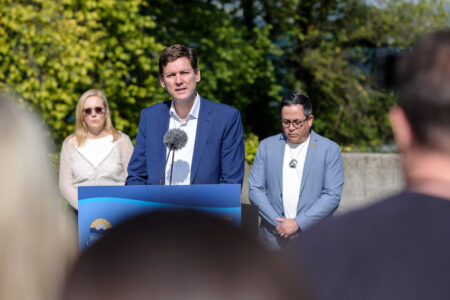Nelson City Council — Seeds germinate on solar community garden project
Nelson could be growing a solar community garden soon after city council decided the first-of-its-kind project in Canada had some merit.
On Monday night during their regular meeting council elected to have staff proceed with finalizing the details of the Solar Community Garden Project.
Those details will include nailing down a location and the costs involved, preparing the necessary bylaw amendments and developing the purchasing contracts for customers.
Nelson Hydro general manger Alex Love told council the next step would be to finalize the cost of the land location, the biggest unknown cost.
Utilizing solar sensor data, a solar pathfinder, and the PVsyst energy generation modeling software, the city’s former transfer station site was deemed to be the best for an array installation. Davies Street Park, Elephant Mountain and the airport were also found to have good solar potential.
As well, the Chamber of Commerce parking area (Railtown), the Bonnington Generation Station, Selkirk College’s roof and the Chako Mika Mall roof were also favourable.
The design discussed in the cost study report would require an unshaded area close to a full size soccer field. The design of the array can be configured to fit various shapes of land parcels and roofs.
“So basically (the next step) would be a refinement of the cost estimate and the buy-in model, and then we would bring that back to council,” he said.
With the community solar garden — a centralized solar panel array installation — people could choose to subscribe to a portion of the solar array and receive a credit on their utility bill in proportion to investment, doing their part for the environment by using green energy.
The program could be less expensive for people who want to use solar energy, but aren’t able to afford the cost of setting up their own system.
The initial project would be small with the option to expand, while participation in the solar garden would be available to Nelson Hydro customers on a voluntary basis.
The solar array would be installed in potential locations and would feed into the Nelson Hydro grid — becoming part of Nelson Hydro’s capital assets. Customers would have no ownership rights to the solar system itself.
After a location has been chosen and costs narrowed, a bylaw amendment and a community information meeting would be set for late summer.
Twenty-five year contracts would be set up for customers to receive a solar credit on their Nelson Hydro bill on an annual basis in proportion to their investment.
The solar credit would be measured in kilowatt hours for the energy produced.
If the pre-sale commitment is met, construction could begin this fall.
Nelson Hydro has already set aside a budget of $25,000 for the Community Solar Garden in the 2015 business plan. City manager Kevin Cormack said the city is currently pursuing additional grants to help fund the start-up of the project.
Opening the door to debate
After almost six months of debate and red tape, the final public word on the rezone for Alpine Lake Suites has been set.
A public hearing on the rezone of the former Marianne Apartments has been set for the next city council regular meeting, Aug. 8.
The Alpine Lakes Suites have been deemed non-conforming within density requirements for its R2 zone since 2013 when city council adopted a new zoning bylaw.
With 49 units currently in Alpine Lake Suites, under the R2 zoning in which the building resides it is permitted to only have 26 units.
This anomaly only matters when structural alterations or additions are proposed: Those changes cannot be made to a building while it is non-conforming.
The Suites owner would like to upgrade and renovate the building, but can’t because the building does not conform to the density (use) requirements of the R2 zone.
A new direction for CBT funding
A new Columbia Basin Trust Community Initiatives Program policy will be developed for the city of Nelson after council directed staff to develop some new ideas surrounding the disbursement of the annual hydro cash.
The new policy is expected to allow for a consistent and efficient approach to the annual allocation of grant funds made available to the City of Nelson under the program.
Previously city council faced some challenges in determining how it best distributed funding amongst applicants for CBT’s Community Initiative Program (CIP), as the range of funds to grant varied, as did the differing views of council members on projects to support.
When the 2015 grant process concluded in April the city’s allocation of $126,447 — of the $901,144 total initiative funds available for 2015 — had 47 applicants and $247,545 requested (almost twice the funds available).
In previous years council allocated up to 35 per cent of the CBT available funding to the culture sector. As well, the city’s Cultural Development Committee appointed a jury to adjudicate the arts, culture and heritage sector applications.
However, city council has not involved the community in adjudicating other sector applications in previous years and elected to do it on its own.
“But there’s been some thought given to this,” said Mayor Deb Kozak of the 2015 allocation. “And we’ve talked about perhaps revising our process so that we become even more responsive to community.”
In order to fall more in line with the Path to 2040 Sustainability goals and focus areas, city staff has suggested that new policy and procedures be established in regards to the CBT funding.
Council could have three options for consideration, including investigating ways to involve the community to assist with the program adjudication process, or it could not preset funding allocations and determine each application entirely on its own merit.
The third option — using the four core areas of sustainability — would set a soft target based on the quality of applications and how well they meet the community’s goals and objectives. That policy would set a format that hands out cash based on mean values (majority versus average values).
The Regional District of Central Kootenay administers the Community Initiatives Program on behalf of the CBT. Council’s list of supported projects goes to the RDCK board for final approval.
Last year the city allocated $44,256 to the arts, culture and heritage sector, an amount of 35 per cent of the $126,445 it received from the CBT.

























